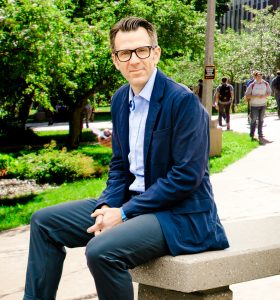
Dennis Livesay (CC) will present his talk, “The Distance Constraint Model: A Flexible Approach to Understand Protein Thermodynamics” on Thursday, September 9, 2021, at 4:00 p.m. in Fisher Hall 139.
Read more about Livesay’s research background and the presentation on the University Events Calendar.
Talk Title: The Distance Constraint Model: A Flexible Approach to Understand Protein Thermodynamics
Abstract: A distance constraint model (DCM) is presented that uniquely integrates mechanical and thermodynamic descriptions of protein structure. The model is based on a rigorous free energy decomposition scheme that represents structure as fluctuating constraint topologies, while explicitly accounting for entropy nonadditivity. Rigid and flexible substructures are identified as a function of thermodynamic condition, resulting in a large set of quantified stability/flexibility relationships (QSFR) that collectively describe protein stability, structure, dynamics, and the relationships therein. The utility of the QSFR analyses is demonstrated through comparisons across three different beta-lactamase enzyme families.
Bio: Dr. Dennis R. Livesay is a professor in the Department of Applied Computing and the Dave House Dean of Computing at Michigan Tech. Prior he was dean of the College of Engineering at Wichita State University. He has additionally had faculty appointments in departments of bioinformatics, biomedical engineering, chemistry (twice), and computer science. His research expertise is in the area of protein family sequence/structure/function relationships, specifically focused on understanding how physicochemical properties vary with evolutionary divergence. To that end, his lab combines and compares first-principles (biophysics) models with empirical (bioinformatics) descriptions of proteins. During his active research career, his lab was continuously funded by external grants, primarily from the National Institutes of Health and MedImmune, a large biotech company. He has been a grant reviewer for the National Institutes of Health, National Science Foundation, Research Corporation, and the W.M. Keck Foundation and has served on the editorial board of seven journals, including BMC Bioinformatics and PLOS Computational Biology, two of the top journals in the discipline.